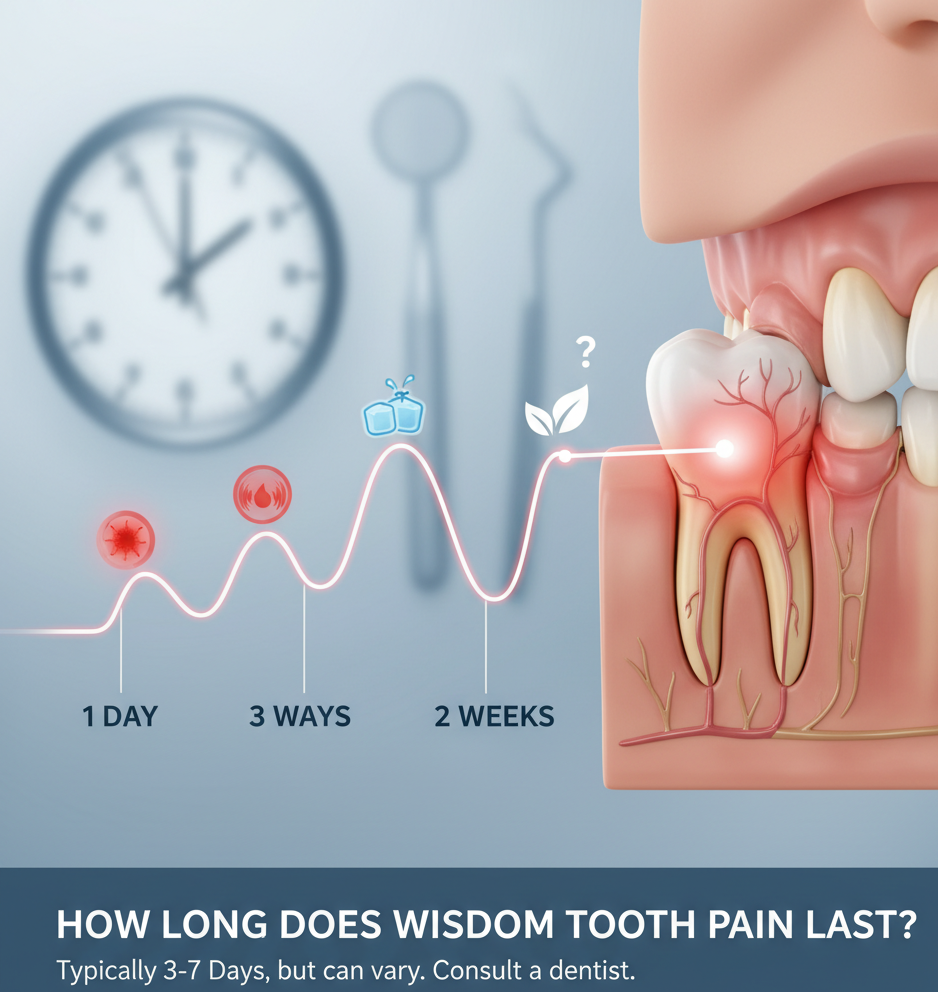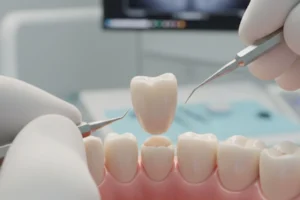How Long Does Wisdom Tooth Pain Last?

How Long Does Wisdom Tooth Pain Last?
Wisdom teeth are the last molars to appear, usually erupting between ages 17 and 25. For many people, their arrival brings discomfort or even severe pain. If you’re currently dealing with wisdom tooth pain, you’re probably asking the same question countless others have typed into search engines: How long does wisdom tooth pain last?
Let’s break down what you can expect, when to worry, and how to find relief.
Understanding Wisdom Tooth Pain
Wisdom teeth don’t always cause problems. Some people never feel them come in, while others experience pressure, swelling, and throbbing pain. The discomfort comes from:
- Eruption: As the tooth breaks through the gums.
- Impaction: When the tooth is trapped under the gum or pushes against other teeth.
- Infection: When bacteria get trapped around the partially erupted tooth.
The duration and intensity of pain depend on whether your wisdom tooth erupts normally or causes complications.
How Long Does Wisdom Tooth Pain Last Normally?
- Mild eruption pain: A few days to a week while the tooth breaks through the gums.
- Persistent soreness: Can come and go for weeks if the tooth is slowly erupting.
- After extraction: Pain is usually worst in the first 2–3 days, easing within 7 days. By 2 weeks, most patients feel fully healed.
In short: normal wisdom tooth pain doesn’t usually last longer than a week or two. If you’ve been in pain for longer, it’s time to consult a dentist.
When Wisdom Tooth Pain Is Not Normal
Pain is part of the process, but certain symptoms mean you should see a dentist immediately:
- Pain lasting more than 2 weeks
- Swelling in the jaw or cheek
- Difficulty opening your mouth
- Fever or chills
- Bad taste or persistent bad breath
These may signal an infection or impacted wisdom tooth that needs professional care.
Tips to Relieve Wisdom Tooth Pain at Home
While waiting to see your dentist, you can try these safe remedies:
- Cold compress: Apply ice packs to reduce swelling.
- Saltwater rinse: Warm saltwater helps keep the area clean and eases irritation.
- Over-the-counter pain relief: Ibuprofen or acetaminophen can help manage discomfort.
- Soft foods: Stick to soups, yogurt, and smoothies to avoid chewing stress.
- Good oral hygiene: Brush gently around the area to prevent infection.
These steps won’t cure the problem if your tooth is impacted, but they can ease discomfort until you get treatment.
Treatment Options for Lasting Relief
If your wisdom tooth is the source of recurring pain, your dentist may recommend:
- Monitoring: If the tooth is erupting normally and pain is temporary.
- Antibiotics: For infection around the tooth.
- Extraction: The most common solution for impacted or problem wisdom teeth.
For some patients, tooth removal may also lead to discussions about restorative options. In those cases, it’s helpful to learn about treatments like dental crowns or dental bridges if replacement becomes necessary.
Recovery Timeline After Wisdom Tooth Removal
If extraction is necessary, here’s what recovery usually looks like:
- Day 1–3: Swelling and pain peak.
- Day 4–7: Pain decreases, most people return to normal activities.
- 1–2 weeks: Almost fully healed, though deep healing continues inside the gums.
- 1 month: Full recovery.
Some patients who lose teeth due to complex extractions may also consider options like dental implants, which provide a long-term, natural-looking solution.
Local Care Matters
Wisdom tooth pain can feel overwhelming, but you don’t have to face it alone. A local dentist in Milton, Ontario, can assess your situation, take X-rays, and recommend the best treatment. Whether you need short-term relief or an extraction, having professional guidance ensures peace of mind and long-term oral health.
FAQs About Wisdom Tooth Pain
1. How long should I expect wisdom tooth pain to last without removal?
Usually a few days to a week, but if it persists beyond two weeks, see a dentist.
2. Can wisdom tooth pain come and go?
Yes, especially if the tooth is slowly erupting. Pain may flare up, then subside, before returning.
3. Do all wisdom teeth need to be removed?
No. If they erupt correctly and don’t cause issues, removal isn’t necessary.
4. What can I eat after wisdom tooth extraction?
Soft foods like yogurt, mashed potatoes, smoothies, and scrambled eggs are recommended.
5. When should I call a dentist about wisdom tooth pain?
If the pain is severe, lasts longer than two weeks, or is accompanied by swelling, fever, or difficulty swallowing.
Final Thoughts
Wisdom tooth pain can range from a temporary nuisance to a serious dental issue. While mild discomfort may last a few days, persistent or severe pain is a sign that you need professional care. If you live in Milton and are struggling with wisdom tooth pain, don’t wait—reach out to a trusted dental clinic like Smile Lounge to get relief and protect your oral health.
If you’re exploring solutions after wisdom tooth extraction, our detailed guides on dental bridges, dental crowns, and dental implants can help you make the right decision for long-term oral health.
Your smile deserves comfort, not pain. A timely consultation ensures you can move forward without the stress of constant wisdom tooth discomfort.










